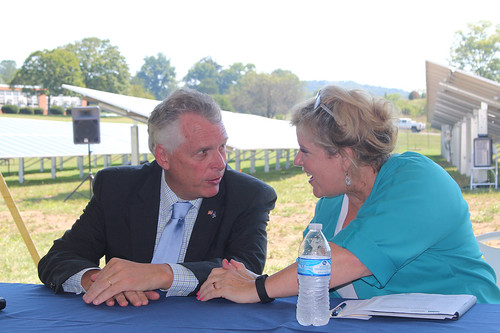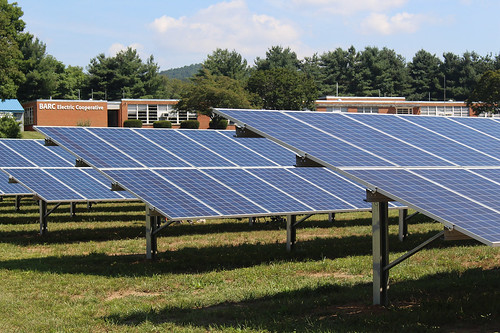
Many people in this country would love to use solar or other types of renewable energy in their homes, but barriers may exist to stifle interest in small-scale renewable energy implementation.
Not everyone has the roof space, the sunlight, or the money for a solar energy project. Not everyone has the weather or the local know-how for a wind energy project. The list could go on, but any hurdles such a list might include will no longer hinder the residents of Rockbridge, Bath, Highland, Augusta and Alleghany, Virginia, from realizing their goal of using clean energy in their homes.
I recently visited Rockbridge, along with Virginia Governor Terry McAuliffe, to commission BARC (Bath, Alleghany, Rockbridge County) Electric Cooperative’s new community solar project – the first of its kind in Virginia. Community solar allows customers in different locations to participate collectively in solar power generated at a single facility, instead of each customer having to install solar panels on her own rooftop.
BARC installed solar panels on an abandoned elementary school’s soccer field and used the school house to establish a solar energy learning center. The solar panels provide energy for the BARC members who subscribe. The learning center is open to the public for school field trips and other learning opportunities.
USDA contributed a $250,000 Rural Energy for America Program (REAP) grant for the project, which will offset 25 percent of the energy needs at the homes of 225 BARC members.
This collective initiative reminds me of stories my grandparents and parents told me about “Victory Gardens” during World War II. Victory Gardens were planted during the Great War to reduce pressure on the public’s food supply, and everyone took honor in that. Americans planted gardens in backyards, front yards, school yards, and even on public lands – from the Boston Commons to the Golden Gate State Park.
Almost every park in every city had a garden growing vegetables. Neighbors pooled their resources and even formed cooperatives like BARC all in the name of patriotism. All together about 40 percent of the nation’s vegetable produce came from Victory Gardens during the Great War.
Victory Gardens helped every American contribute, and they were a lesson for every household – a daily reminder for us to do our part and a reminder of the tremendous power of collective action.
Energy independence is about national security. Even with all the gains in alternative energy and natural gas, we still as a nation rely on fossil fuel. Our reliance on fossil fuels will not be solved by one silver bullet, but rather by many small BBs, and this project is one of those small BBs.
In my mind, the BARC Solar “Victory” Garden here today is a forward-looking step to energy independence, financial freedom, community engagement and environmental responsibility. We’re happy as a federal family to be a part of it, and we want to thank BARC Electric Cooperative and its members for doing their part.
The REAP program is now taking applications for the next round of awards. To find out more about the REAP program, contact your state’s USDA Rural Development office.
And to find out more about how USDA is investing in a clean energy future, visit our latest medium.com chapter, Powering America with a More Sustainable Energy Future.

